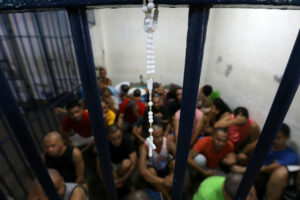
Philippine prisoners to get improved healthcare
By Chloe Mari A. Hufana
VARIOUS agencies led by the Department of Health (DoH) on Monday signed a joint administrative order promoting healthcare among prisoners nationwide.
“This policy aims to establish a health-protective and health-promoted environment and wellness and longevity for individuals in detention to set up a responsive health system for those who have been deprived of liberty,” Health Secretary Teodoro J. Herbosa said at the signing at the Manila Hotel.
He said one of the pillars of the order is health promotion. “It is very important to have healthy environments — physical, mental and social determinants — to protect and promote the health of persons in jail,” he said in mixed English and Filipino.
“Secondly, healthcare services are very important when prisoners fall ill. We will establish facilities, and that is the request from Bureau of Jail Management and Penology (BJMP) Director Ruel S. Rivera — to help them build better health service facilities,” he added.
Mr. Herbosa said his agency is working with the Department of Justice (DoJ) to expedite the courts’ decision-making process because prisoners are exposed to health risks that could be mitigated if they were released.
Under the order, the Philippine Health Insurance Corp. (PhilHealth) will facilitate the registration of prisoners under the program.
“We will ensure that prisoners are informed of their rights and benefit enhancement entitlements under the national health insurance program,” PhilHealth President and Chief Executive Officer Emmanuel R. Ledesma, Jr. Said.
He added that a government program that gives poor patients free medical care in government hospitals would be extended to poor prisoners.
The most common health problems in prisons include upper respiratory diseases, skin conditions, mental health issues, allergies and concerns related to hygiene and nutrition, Health Assistant Secretary Albert Francis E. Domingo said at the event.
Heart attacks and arthritis also threaten prisoners, Mr. Ledesma said.
BJMP Chief Superintendent Ilna Rita B. Maderazo said the bureau plans to enforce healthy places of detention by improving health services, providing regular checkups and ensuring access to sanitation and nutrition.
“We aim to establish partnerships with health organizations and nongovernmental organizations to provide specialized health programs,” she said. “We are also focused on training jail personnel in health and safety protocols, ensuring they are equipped to manage health-related issues effectively.”
Mental health support is a critical area that the BJMP aims to push among their workers to create a safer and healthier environment inside facilities.
Meanwhile, Bureau of Corrections (BuCor) Director-General Gregorio Pio P. Catapang, Jr. said they are looking at ways to decongest the national penitentiary in Muntinlupa City with an additional P900-million budget.
Out of 478 jail facilities nationwide, 323 were congested, with occupancy rates ranging from 101% to 2,739%, according to a Commission on Audit report in 2022.
The total jail population of 127,031 in December 2022 exceeded the total ideal capacity of 46,702, resulting in unhealthy living conditions for prisoners.
Last week, the DoJ and BuCor signed a declaration with the University of the Philippines Manila-College of Medicine and the United Nations Office on Drugs and Crime to strengthen the investigation process on the death of prisoners.
Under the declaration, BuCor authorities will transport prisoners’ dead bodies to UP Medicine facilities for autopsies.
Before, autopsies conducted by medical professionals were only performed on prisoner deaths suspected of foul play.
More than 4,600 prisoner deaths were registered by BuCor from 2020 to June 30, 2024. This year, it counted 487 deaths, Mr. Catapang said last week.



